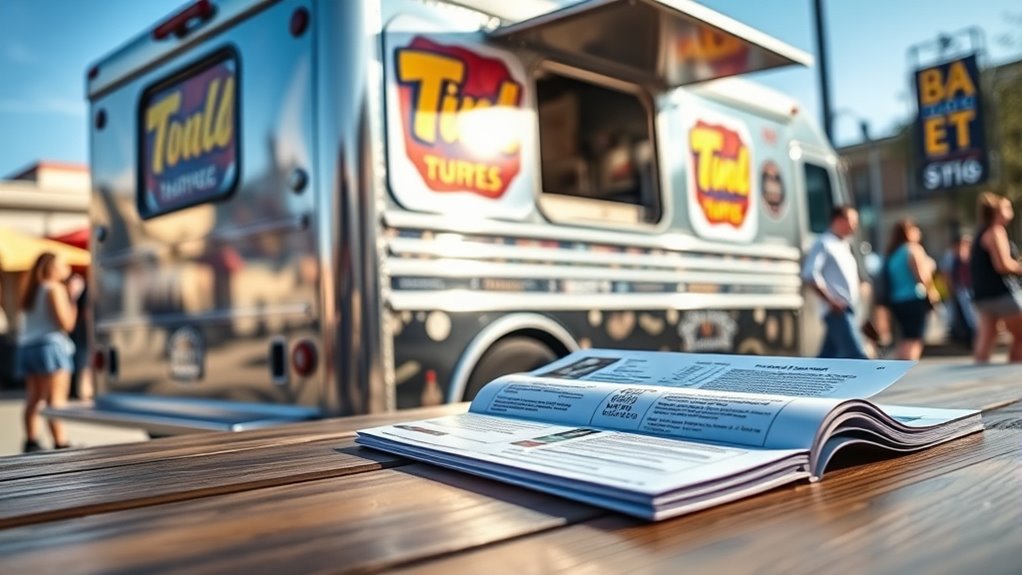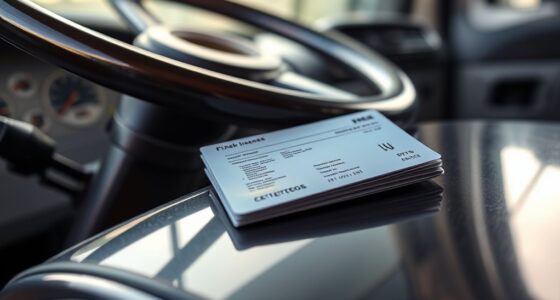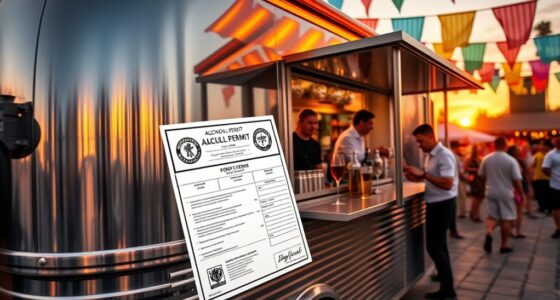Food truck insurance covers your vehicle, business assets, and liabilities to protect against accidents, theft, and food safety claims. Key coverages include auto insurance, liability for injuries and property damage, product liability for food-related issues, and additional policies like workers’ comp and equipment protection. These policies help you meet legal requirements and keep your business running. To understand how to tailor your coverage and keep your business safe, keep exploring these essential protections.
Key Takeaways
- Commercial auto insurance protects the food truck from accidents, theft, and damage, ensuring mobility and vehicle-related coverage.
- Liability insurance covers third-party injuries, property damage, and advertising injuries like libel or slander.
- Product liability insurance addresses risks from foodborne illnesses, contamination, and claims after food delivery.
- Additional policies such as workers’ compensation, equipment coverage, and business interruption safeguard against operational disruptions.
- Proper insurance is essential for legal compliance, managing risks, and ensuring business continuity in the food truck industry.
Types of Essential Coverage for Food Trucks

To keep your food truck protected and compliant with legal requirements, you need to understand the essential coverage options available. Commercial auto insurance is crucial; it covers accidents, theft, and damage to your truck and attached equipment like refrigerators and ovens. It also protects against third-party property damage and injuries, often including personal injury protection (PIP) and uninsured motorist coverage. Commercial auto insurance is a fundamental component because it specifically addresses vehicle-related risks unique to food trucks operating on public roads. Additionally, understanding the importance of clear communication can help prevent disputes with insurers and expedite claims processing. Business interruption insurance helps you stay afloat if unexpected events, like storms or fires, halt operations, covering lost income. Workers’ compensation is necessary if you employ staff, covering their medical bills and lost wages after workplace injuries. Ultimately, product liability insurance shields you from claims related to foodborne illnesses or allergies, safeguarding your business from costly legal issues.
Specific Liability Protections You Need
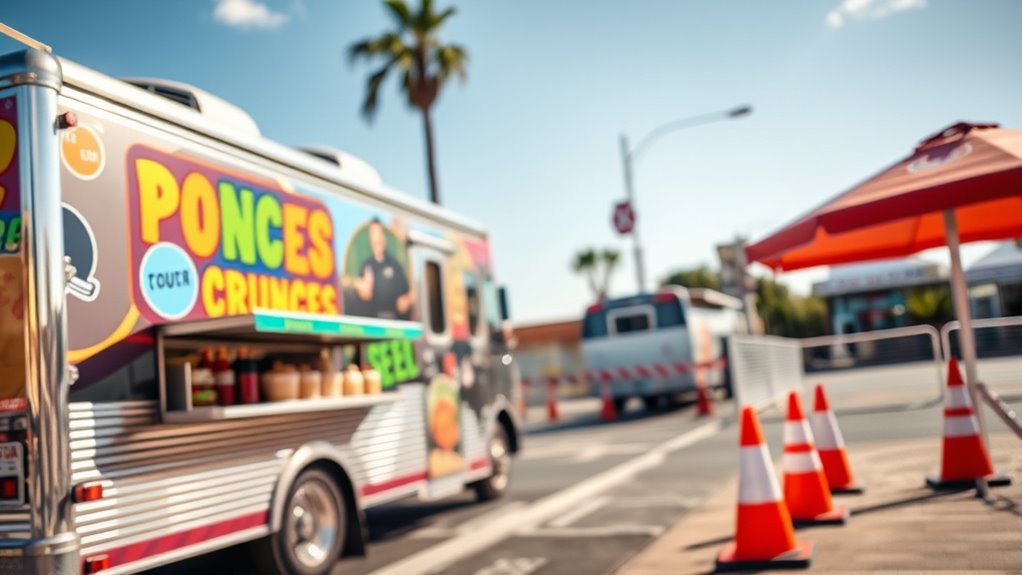
Understanding the specific liability protections your food truck needs can make a significant difference in managing risks and safeguarding your business. General liability coverage is essential, protecting you against third-party bodily injury claims, property damage, and advertising injuries like libel or slander. Product liability is equally important, covering foodborne illnesses, allergic reactions, and contaminated food risks, which are common concerns in food service. Products-completed operations insurance safeguards you from claims arising after delivery, such as food poisoning or catering mishaps. Additionally, personal and advertising injury protection covers legal expenses from marketing-related claims. Finally, damage to rented premises coverage helps protect against accidental damage at temporary or shared sites. These protections ensure you’re prepared for the most common risks faced by food truck operators. Incorporating Glycolic acid into your skincare routine can also help improve the appearance of your skin, especially if you experience irritation or uneven texture from outdoor work.
Additional Policies to Consider
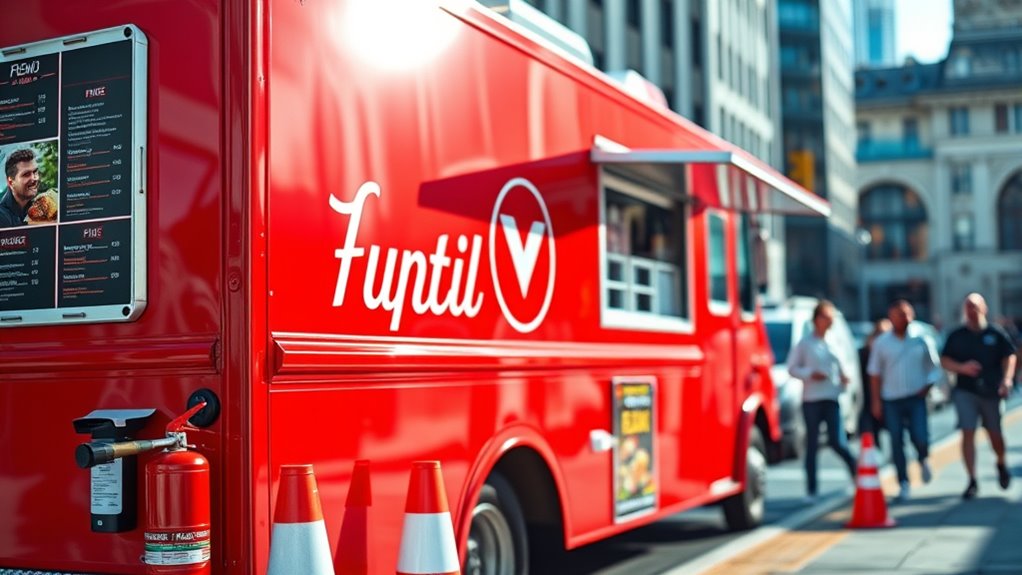
In addition to liability protections, there are several policies you should consider to fully safeguard your food truck business. Workers’ compensation insurance is essential if you employ staff, covering medical expenses and lost wages from workplace injuries, and protecting you from related lawsuits. Business interruption insurance helps maintain income during temporary closures caused by accidents, weather, or equipment damage, ensuring your finances stay stable while repairs happen. Commercial auto insurance is mandatory for on-road operations, covering vehicle damage, theft, and liability risks. Equipment and tools coverage protect critical appliances like grills and refrigeration from theft, damage, or mechanical failure, minimizing downtime. Additionally, renting or leasing property at third-party locations should be covered with damage to rented premises insurance, which safeguards you from unexpected costs and supports good business relationships. It’s also important to understand emotional manipulation and other behaviors associated with difficult relationships, as recognizing these patterns can help you protect your emotional well-being.
Factors That Influence Insurance Costs
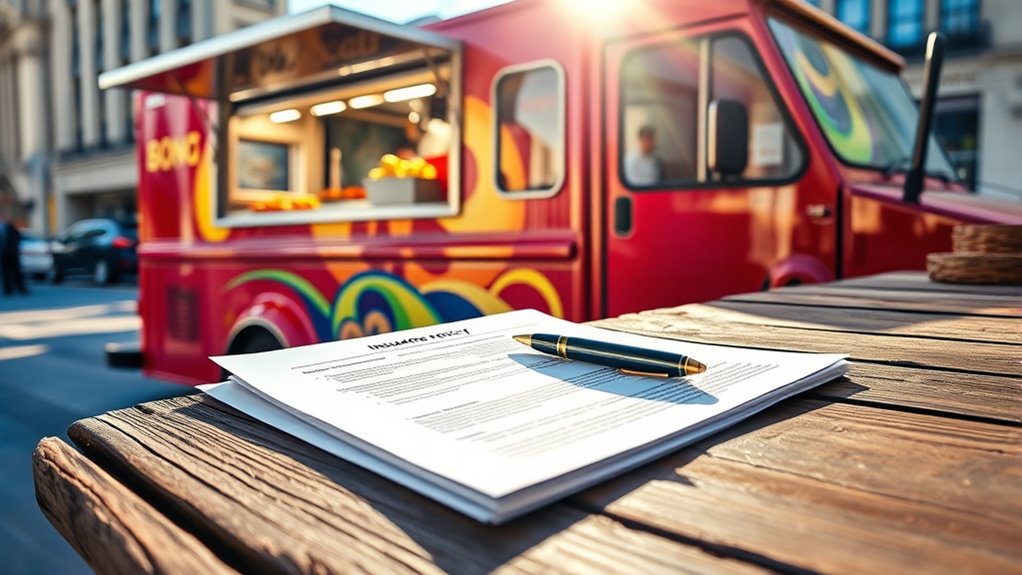
Your insurance costs are shaped by the risks associated with food preparation, the value of your equipment, and where you operate. Larger kitchens or high-end appliances increase premiums, while working in busy urban areas can also raise costs. Understanding these factors helps you manage expenses and choose the right coverage. Furthermore, the size and type of your vehicle can also significantly impact your insurance premiums. Considering home decor elements like wall organization systems or stylish serveware can also influence your overall setup and operational costs.
Food Preparation Risks
Food preparation risks considerably influence food truck insurance costs because they directly impact the likelihood of claims related to foodborne illnesses, employee injuries, and fire hazards. If you don’t follow strict food safety protocols, you increase the chance of contamination or allergic reactions, which can lead to costly liability claims. Employee injuries such as burns, cuts, or slips are more common in cramped, mobile work environments, raising workers’ compensation expenses. Additionally, the use of flammable materials like cooking oils, propane, and gasoline heightens fire risks. Proper maintenance, safety procedures, and adherence to fire safety guidelines help reduce these hazards. Implementing regular safety training and inspections can further minimize risks. Ensuring compliance with food safety regulations is essential to avoid penalties and enhance customer trust. By managing food prep risks effectively, you can lower your insurance premiums and protect your business from costly claims and liabilities.
Equipment and Location
The value of your food truck’s equipment and its location play a significant role in determining insurance costs. Higher equipment values, like expensive refrigerators or fryers, increase premiums because they pose greater replacement and repair risks. Equipment breakdown coverage, often available as endorsements, adds to your overall premium. Insurers also require detailed inventories to set accurate coverage limits. Proper documentation of equipment and inventory helps streamline claims and ensures appropriate coverage levels. Your truck’s location impacts costs too. Moving to high-traffic or high-crime areas, or frequent travel to events, raises risk factors like theft, weather damage, and accidents. Additionally, understanding regional legal resources can help you navigate insurance claims and liability issues more effectively.
How Insurance Safeguards Your Business
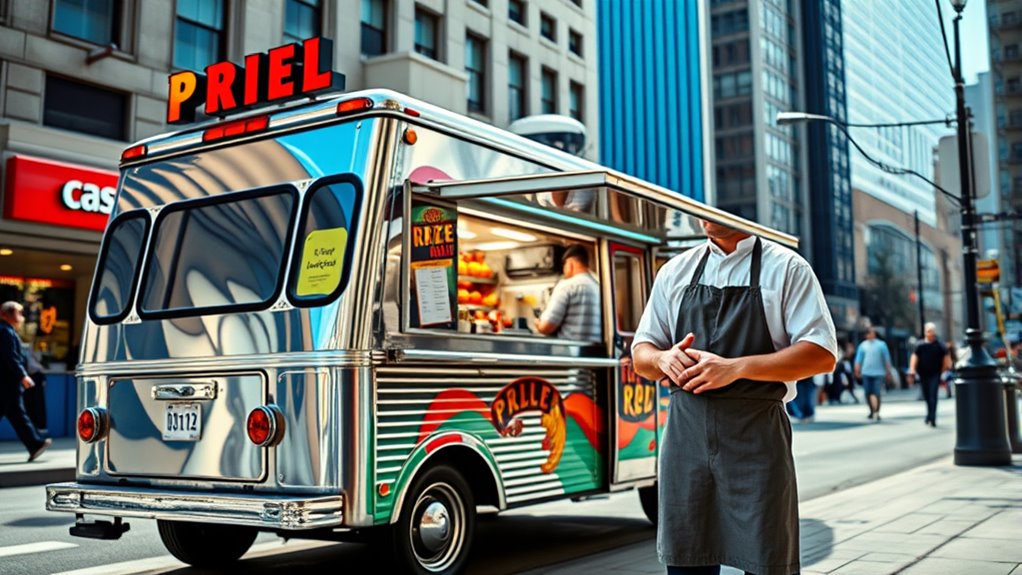
Insurance acts as a crucial safeguard for food truck businesses by providing financial protection against a variety of risks. It covers third-party bodily injuries, like customers slipping or falling, and property damage caused during your operations. If a customer gets sick from contaminated food or burns themselves, your insurance helps cover the costs. It also protects against advertising injuries, such as libel or slander claims. Product liability insurance guards against lawsuits from foodborne illnesses or allergic reactions, ensuring you’re covered even after the sale. Additionally, insurance reimburses damages to rented spaces or equipment, preventing costly out-of-pocket expenses. Liability coverage protects your business from legal claims related to accidents or injuries. Protecting your commercial vehicle with auto coverage is essential for mobility and asset safety. Moreover, understanding the financial aspects of your insurance policy helps ensure you have adequate coverage tailored to your specific needs. Overall, insurance offers peace of mind, helping your business stay resilient despite unexpected incidents.
Legal Requirements and Regulatory Considerations
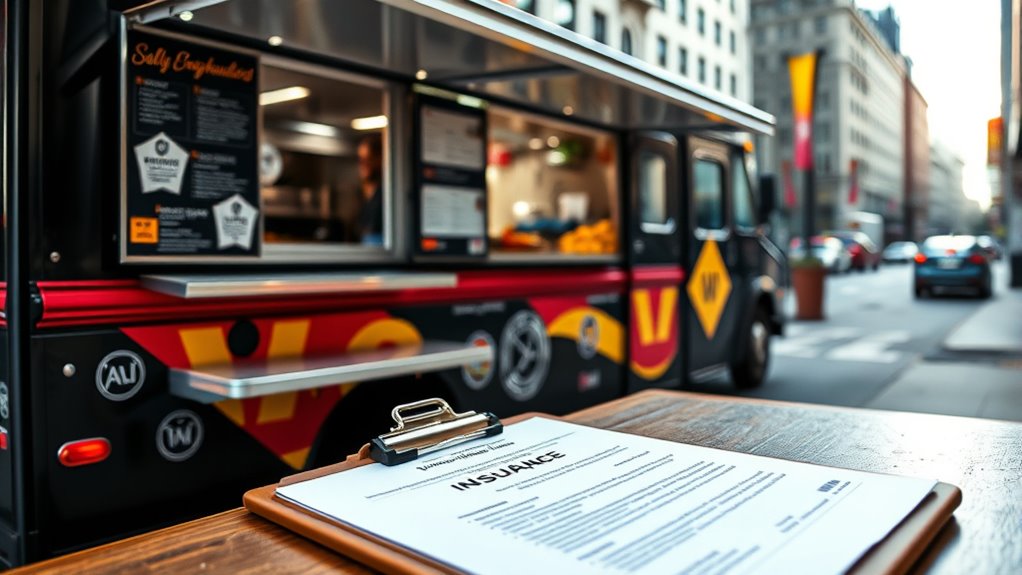
- Complying with zoning and permit requirements often involves proof of insurance.
- Insurance must reflect your menu and food risks.
- Food safety regulations frequently demand product liability coverage.
- Event and festival permits may require certificates of insurance.
Frequently Asked Questions
How Do I Choose the Right Insurance Provider for My Food Truck?
When selecting a food truck insurance provider, you should focus on their expertise in mobile food business coverage. Look for customizable policies that include liability, auto, and equipment protection. make certain they offer quick online quotes, instant COIs, and reliable customer support. Check their financial strength and reviews to confirm their reliability. Prioritize providers that cover multiple locations and allow adding insured parties at no extra cost, making your operations smoother.
Can I Bundle Multiple Insurance Policies for Better Rates?
Think of bundling insurance policies like hitting two birds with one stone—you save money and simplify your life. Yes, you can bundle general liability, auto, and property insurance into a Business Owner’s Policy, often at a discounted rate. But, check eligibility, as factors like business size and assets matter. Comparing providers like NEXT or FLIP helps you find the best rates and coverage for your food truck adventure.
What Documentation Is Required to File an Insurance Claim?
When you file an insurance claim, you need to gather all relevant documentation. This includes your valid insurance policy, driver’s license, and proof of insurance for all involved parties. Also, collect incident reports, photos of damages, witness statements, receipts, maintenance logs, cargo documents, and medical records if injuries occurred. Having these prepared helps speed up the process and guarantees your claim is complete and accurate.
How Often Should I Review and Update My Food Truck Insurance Coverage?
You should review and update your food truck insurance at least once a year to stay current with your business changes. Anytime you add new equipment, expand services, or move into new regions, update your policy immediately. Keep an eye on local regulations and any significant business shifts, like new vehicles or ownership changes. Regular reviews guarantee your coverage aligns with your risks, helping you avoid gaps, reduce costs, and stay compliant.
Are There Specific Insurance Discounts Available for Food Trucks?
Think of insurance discounts for food trucks as hidden treasures in your safety map. You can access savings through bundling policies, maintaining a clean driving record, and installing safety gear. Some insurers also reward regional safety practices or using GPS systems. Companies like NEXT Insurance and The Hartford offer tailored discounts. By keeping your operations safe and well-maintained, you maximize your chances of uncovering these valuable discounts and lowering your premiums.
Conclusion
Having the right food truck insurance is your shield in a busy marketplace, protecting your business like a sturdy umbrella in a storm. By understanding essential coverages, liability protections, and legal requirements, you’re setting yourself up for smoother rides ahead. Don’t leave your business vulnerable—think of insurance as the backbone that keeps you standing tall through every twist and turn. With the right coverage, you’ll navigate the food truck world confidently and safely.
